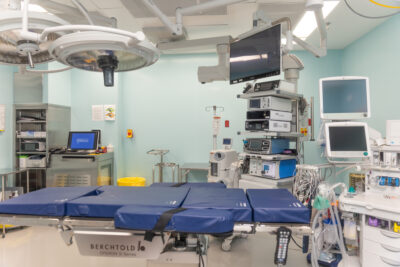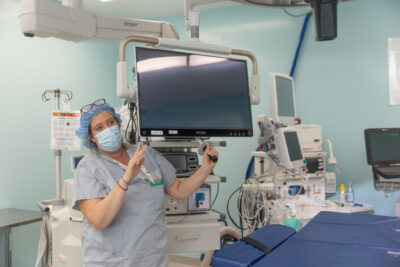An Exciting Upgrade
The new laparoscopic suites at Yarmouth Regional Hospital (YRH) are to the ones installed a dozen years ago as smart phones are to flip phones. Almost everything in the two operating rooms is brand new — lights, monitors, screens, beds, cameras and all of the other technology and specialized equipment our surgeons need to do their work, says Gina Leaman, nurse manager for Perioperative Services. (Perioperative is the term for the whole process from admitting to procedure to recovery.)

One of YRH’s two upgraded laparoscopic suites.
The new minimally invasive surgical (MIS) suites were made possible thanks to the Yarmouth Hospital Foundation, which covered the full cost of $1.5 million. “The old suites were a big improvement but the new suites are a thousand times better,” says team leader Deborah Janke. “The technology is so much better for patients, as well as the staff.” It allows the surgical staff easy visual access to x-rays, CT-scans and MRIs, and that improves accuracy and speed, Deborah says.
Since Yarmouth Regional is a teaching hospital, medical residents and student nurses often attend and the camera system and monitors can shift around to get the best views for the surgeons and nurses and to help them teach. About half of all surgeries are laparoscopic, but the equipment is also a major asset for open surgeries, making detailed visual information available at the push of a button.
What is Laparoscopic Surgery?

Gina Leaman — Nurse Manager for Perioperative Services
Laparoscopy is a less invasive surgery than open surgery and requires less recovery time. A laparoscope, a thin lighted tube that has a video camera, is inserted via a tiny incision to examine and treat the organs of the abdomen. Hernias, gall bladders, appendixes and bowels are the four most common surgeries performed in Yarmouth. Often five or six procedures are performed in each of the suites daily, but some surgeries, like bowel surgery could take a whole day, Gina says.
Laparoscopic technology is also used to give physicians a clear and detailed picture of a patient’s condition, to allow the physician to determine how that condition should be treated. For example, many of the scopes for hip and knee problems are done here, which frees up OR time in Kentville where the more complex surgery is done.
Besides the surgeon, each operation requires an assistant, an anesthetist and three OR nurses. YRH has four general surgeons, two gynaecologists, one ENT (ear, nose and throat) specialist, one ophthalmologist, five visiting urologists two days a week and six visiting orthopaedic surgeons. They are assisted by 22 OR nurses, plus part-time and casual RNs.


